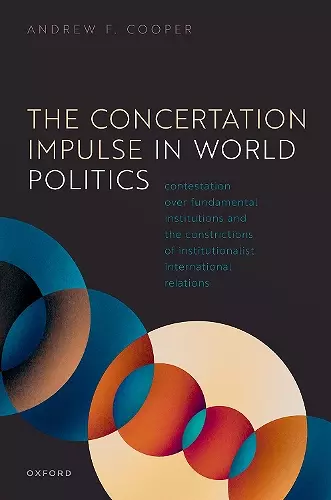The Concertation Impulse in World Politics
Contestation over Fundamental Institutions and the Constrictions of Institutionalist International Relations
Format:Hardback
Publisher:Oxford University Press
Published:21st Dec '23
Currently unavailable, and unfortunately no date known when it will be back

This book unravels the centrality of contestation over international institutions under the shadow of crisis. Breaking with the widely accepted image in the mainstream, US-centric literature of an advance of global governance supported by pillars of institutionalized formality, Andrew Cooper points to the retention of a habitual impulse towards concertation related to informal institutionalism. Rather than endorsing the view that world politics is moving inexorably towards a multilateral, rules-based order, he places the onus on the resilience of a hierarchical self-selected concert model that combines a stigmatized legacy with the ability to reproduce in an array of associational formats. Relying for conceptual guidance on the recovery of a valuable component in the intellectual contribution of Hedley Bull, a compelling case is made that concertation represents a fundamental institution as a peer competitor to multilateralism. In effect, the debate over institutional design is recast away from an emphasis on utilitarian maximization towards a wider set of cardinal - and highly contested - questions: the nature of rules at the global level, the salience of institutional clubs, and the meaning and impact of (in)equality and cooperation/coordination among states across the incumbent West/non-incumbent Global South divide.
In this book, perhaps his most ambitious so far, Cooper brings together a lifetime of work on global governance, diplomacy, and summitry, into a grand synthesis on one of the most significant, yet most neglected phenomena in international relations. The Concertation Impulse in World Politics constitutes a major theoretical breakthrough, conceptualizing the emergence of an alternative to traditional IOs as key entities in the new century. Cooper does justice to the role groups like the G7, the G20 and the BRICS play in a rapidly changing international system, capturing their unique features and dynamics, and providing fresh insights into our troubled and crisis-prone world. * Jorge Heine, Research Professor, Pardee School of Global Studies, Boston University, and Wilson Center Global Fellow *
This fascinating, provocative, and informative book deserves to be widely read. From various cutting-edge perspectives, Prof. Andrew Cooper examines informal concertation and institutionalism in world politics. By putting institutional concert at the center of his book, he analyzes the reasons, motivations for, and different types of institutional concert forms of global governance. * Emel Parlar Dal, Jean Monnet Chair on the EU and Emerging Powers in the Evolving Multilateralism (2020-2023), Marmara University *
Finally a book on how and why powers have been meeting to work in concert for more than half a millennium and still do - a gauntlet thrown down to every student of international organizations. * Iver B. Neumann, author of Governing the Global Polity *
This book offers a historical perspective on the development of informal and formal institutions while also shedding light on the contemporary tensions in the global system. It is a timely work as international institutions-and multilateralism-are under stress. It challenges how we should think about institutional change in terms of the idea of concertation in a context of fluid global environment. A compelling work of scholarship that recasts the study of International Relations and challenges its privileged Northern position. * Mzukisi Qobo, Head of the Wits School of Governance, University of the Witwatersrand, and member of the Presidential Economic Advisory Council, South Africa *
At a time of renewed geopolitical conflict this valuable book refocuses our attention on the importance of informal groupings of major states and of the 'concertation impulse'. Cooper differentiates his analysis from mainstream institutionalist theory in viewing concertation as a fundamental institution of international society, albeit one involving hierarchy and exclusion. Looking to the experience of the G7 and G20, he convincingly argues for the relevance of this kind of ordering in times of crisis and systemic disruption. We are often presented with a dangerous and implausible choice between the restoration of a western-led 'rules-based global liberal order' on the one hand and a world of anarchy and conflict on the other. It is vital that we follow Cooper in thinking through a richer range of institutional alternatives and possibilities. * Andrew Hurrell, Balliol College, Oxford *
a masterful account of the history and logic of modern concert diplomacy. * John Ikenberry, Foreign Affairs *
With its impressive theoretical richness and a fresh perspective on mainstream IR debates, this book opens many exciting pathways for future research. It is particularly valuable to IR scholars pursuing theory development and those interested in understanding informal institutions within IR. * Mihaela Papa, Global Policy *
The concertation impulse in world politics offers a comprehensive, sophisticated and original attempt to reassess the role of informal concertation in International Relations (IR). * Herman T. Salton, International Affairs *
ISBN: 9780198897507
Dimensions: 240mm x 160mm x 26mm
Weight: 746g
400 pages